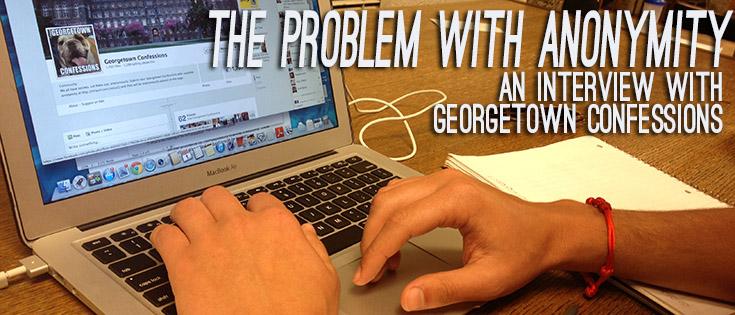In the few weeks between the inception of the Georgetown Confessions Facebook page as an outlet for whimsical admittances and its progression to a forum for heated debate about racial and socioeconomic issues or personal attacks, the person behind Confessions was overwhelmed with the volume and maliciousness of anonymous posts.
“I thought the Confessions would be primarily humorous and fun and never thought that intense discussions about race, socioeconomic class and other similar topics would emerge on the page,” Confessions wrote in an online chat.
Many of the discussions on Georgetown Confessions begin with a contentious confession followed by a debate in the comment section or another post that references and responds to the original poster.
“I feel like they have the potential to be meaningful, but they usually just become really petty and hateful,” Confessions wrote.
These comments are primarily submitted through an anonymous Google Form, but are occasionally sent through Facebook message, allowing the person who runs the page to know who submitted it, which Confessions acknowledged changes the dynamic of the anonymous page.
“I feel that non-anonymity gives the creator of the page a certain power over the people who send in confessions, compliments, insults, whatever – which I certainly don’t want,” Confessions wrote.
This difference is the reason Confessions encourages people to submit confessions anonymously. “I feel like it completely defeats the purpose of the page’s anonymity aspect,” Confessions wrote.
Georgetown Compliments, a more positive forum for anonymous Facebook posts, accepts submissions only through Facebook message, giving Compliments access to the identity of posters.
“Ultimately, I think [anonymity] encourages certain people to say things they feel they won’t be held accountable for, which I think is how we’re ending up with some really hateful messages being posted,” Compliments wrote about Confessions.
Georgetown Insults, which also exclusively accepts submissions through Facebook messages, shared the same sentiment.
“Complete anonymity, which Confessions claims to offer, makes people feel that whatever they say, no matter how offensive it is, will never be traced back to them. … I assume people find it sort of liberating when they release their pent up thoughts,” Insults wrote in a Facebook message.
Though the name Georgetown Insults implies the page would be a forum for slander, in practical terms, the page has been used quite differently.
“It’s been relatively easy for me because most of the posts are jests among friends or calling out establishments at Georgetown. … People realize that I am a person that they might know and/or be friends with, so they restrict themselves in what they send me,” Insults wrote.
The owner of Confessions has adapted to filtering posts for hateful or offensive content.
“In the beginning, I don’t think I was very good at filtering the confessions, but I gradually improved with experience,” Confessions wrote. “While I believe that the controversial Confessions do promote awareness about diversity-related issues within the Georgetown community, I feel that the negative and hateful comments may paint Georgetown in a negative light to the outside world.”
Recently, a debate arose on Confessions about slut-shaming and sexual harassment, to which Take Back the Night Co-Chair Kat Kelley (NHS ’14) responded. A subsequent post singled out Kelley in a malicious personal attack, displayed here. This instance of cyber-bullying caused outrage among Confessions readers, to which Confessions responded by issuing a formal apology on Facebook and contacting Kelley directly.
“Georgetown students do have the right to ask that posts be taken down,” Confessions acknowledged. The owner of Confessions took the post down due to the general public outrage and proceeded to delete many other confessions at student request. Confessions attributed this particular instance of publication of a hateful confession to inexperience of a new member of the Confessions team.
“Given the tremendous increase in popularity and in the number of confessions submitted daily, I tried to find another person to help me run the page. I let the other person run the page for a few days, and because he/she was unfamiliar with how the page worked and the filtering aspect of the job, a lot of harmful Confessions were posted unintentionally. I didn’t realize what had happened until a few days later, and I thereby deleted the harmful posts and proceeded to issue an apology,” Confessions wrote.
Kelley was skeptical of this rationalization.
“I find it hard to believe that it was just a couple days of one person not filtering because it seems like there should have been a filter on a while ago,” Kelley said.
According to Confessions, similar pages at other colleges do not usually address such divisive issues.
“The page is similar to many other schools’ Confessions pages because many light-hearted confessions are posted each day, but it is different because of the intense discussions about race, socioeconomic status and other similar topics that take place on the page,” Confessions wrote.
It is uncertain whether other schools monitor confessions more closely or if the Georgetown student body is more prone to confession about socioeconomic, racial and sexual issues.
Northwestern Confessions employs a stricter monitoring method than Georgetown Confessions.
“We don’t post any posts with names on them or posts that directly attack a specific person or group of people. … Although this is a space where [Northwestern] students are free to confess, we don’t intend it to also be a vehicle for hate and hostility in the student body. Therefore, we believe a little monitoring is healthy for the page and the community that participates in it,” Northwestern Confessions wrote in a Facebook message.
Confessions noted, however, that the Facebook page shows something distinctive about the Hilltop.
“While the page might paint the Georgetown community in a negative light, especially because of the petty and hateful comments that have arisen in the past, I feel that the page also shows the diversity of opinions within the Georgetown community, in addition to the unity of the student body, especially in response to things like the controversial cyber-bullying posts,” said Confessions.
Confessions suggested that the increased volume of posters and expanded readership might minimize the impact of individual confessions.
“Given the large increase in the page’s popularity over the last several weeks, I’ve become somewhat desensitized to the impact that these Confessions might affect Georgetown students personally,” Confessions wrote.
Georgetown Confessions has prompted many students to reflect on the role of anonymity and public debate on campus, but only time will tell what else this page will show about the Georgetown community.
Photo: Lindsay Lee/The Hoya










FanofMax'sHands • May 6, 2013 at 3:15 pm
Great article! I especially enjoy Max Magerman’s hands!